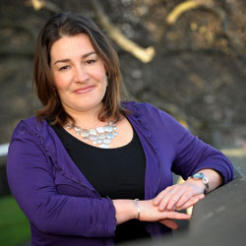An ITV documentary broadcast last night has questioned whether the Charity Commission has sufficient power to tackle extremism in charities.
Charities Behaving Badly, part of ITV’s Exposure series, looked at three examples of extremism in charities and questioned why these charities were allowed to operate.
Presenter Mark Austin questioned whether the existence of the charities would lead the public to perceive the Commission as failing to register and regulate charities effectively.
Michelle Russell (pictured), director of investigations, monitoring and enforcement at the Charity Commission, strongly denied that this was the case.
The Commission has said that the documentary has highlighted the need for increased powers for the Commission which it is looking to address in the Draft Protection of Charities Bill.
The documentary showed footage filmed secretly at three separate charities. The first charity, the Steadfast Trust, has now been removed from the register. The other two charities featured, Global Aid Trust and Hindu Swayemsevak Sangh, are now subjects of separate statutory inquires.
In the documentary, journalist Mark Austin said to Russell that the “bottom line” is that “a charity can be hijacked by fascist and extremists”, but the Commission was unable to act.
In a statement released prior to the documentary’s broadcast yesterday, Russell said: “Rightly the public will be concerned about the footage and the implications for public trust and confidence in these charities, and the potential impact on the charity sector more generally. We can reassure the public that we take these issues seriously.
She said the footage supported the need for more powers for the Commission: “These kinds of incidents illustrate why it is important for the regulator to have the right tools to do the job. There are currently loopholes in the existing regulatory framework which we are seeking to close by looking for increased powers in the Draft Protection of Charities Bill.”
Safeguards needed
However, the NCVO has said that although some provisions in the Draft Protection of Charities Bill would be useful for the Commission to be able to take further action, safeguards would be needed so the Commission cannot “overreact”.
A spokesman said: “However there is a fine balance to be struck. Any charity could make unfortunate or embarrassing mistakes and there must be safeguards to ensure the regulator cannot overreact in such circumstances, especially at a time when it is under pressure, albeit rightly so, to be seen to be more robust. Not all charities have the resources to defend themselves in the way larger organisations can.
He went on to say that the registration of the Steadfast Trust in error “clearly demonstrates” the need to strengthen the registration process.
“We understand the Commission are scrutinising applications in more detail now, which is a welcome move and should lower the risk of problems in the future,” he said.
The spokesman said that NCVO is “very conscious of the risk to the reputation of charitable status” and that the “actions of some of those associated with the organisations profiled last night were clearly cause for great concern”.
Sir Stephen Bubb, chief executive of Acevo, believes that the Commission's existing powers are "more than enough" to deal with the cases highlighted by ITV.
He added: “Too often charities have nowhere to turn for advice on dealing with extremism. The Charity Commission has limited resources and should focus on providing this support rather than launching haphazard investigations. The Commission should know that prevention, not zealous enforcement, is the best policy.”
The Muslim Charities Forum (MCF) also responded to the ITV documentary, saying that “its member charities are vigilant about the potential risks of being exploited by individuals who do not reflect our humanitarian values”.
It has also urged regulators to “rely on credible and impartial information when assessing the actions of a charity”, and for “all organisations to carry out the necessary checks and due diligence using government sources when inviting speakers and have secure policies in place to mitigate any risks”.
MCF said it has been working with the Commission on the issue of extremist abuse in charities and is reviewing its guidance and training for its member charities.









